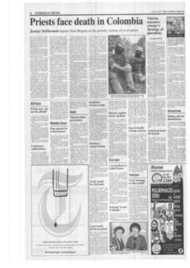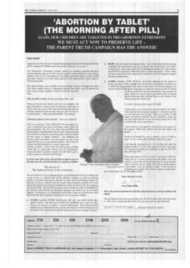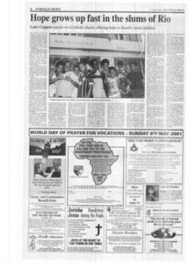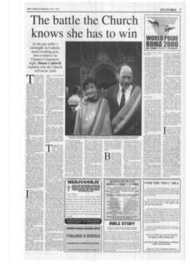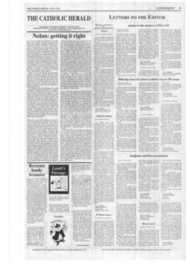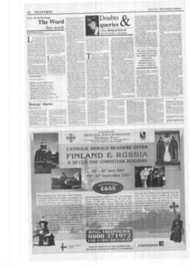Page 7, 4th May 2001
Page 7

Report an error
Noticed an error on this page?If you've noticed an error in this article please click here to report it.
Tags
Share
Related articles
Quest Attac K
Dissent In A Cathedral
Bishop Warned Of Vigilante Threat Over Soho Masses
Technicality Halts Efforts To Reverse Adoption Agency Ban
Church's Silence Baffles Media
The battle the Church knows she has to win
As the gay lobby's onslaught on Catholic moral teaching goes into overdrive on Channel 4 tomorrow
night, Simon Caldwell
explains why the Church will never yield
Tomorrow, Channel 4 will broadcast Queer and Catholic. It is packed with anecdotes about gay seminarians having sex with each other, and aims to demonstrate that the priesthood contains a disproportionate number of gay men, before it asks the question: "Why does the Church still teach that even a homosexual orientation is a tendency toward an intrinsic moral evil, an objective disorder?"
Because Channel 4 is hardly renowned for its objective theological inquiry, a Saturday evening slot on Catholic moral teaching, spanning an hour and 20 minutes, might be viewed with suspicion by many Catholics as yet another occasion of feeble anti-popery.
To a great extent they would be right: much of the programme is nonsense. However, there is also much uncomfortable truth in the observations of the presenter and producer, Mark Dowd, that the priesthood may be on its way to becoming a "gay profession" while the Church, ironically, remains the most principled opponent of the gay rights lobby anywhere in the world.
The Church certainly appears — at least within a secular perspective — to have something of an ambivalent attitude towards homosexuality. On the one hand its teaching encourages sensitivity, respect and tolerance for any gay person, but on the other it insists on the unlawfulness of gay sexual acts.
This was reflected, for instance, in the actions and pronouncements of the late Cardinal Basil Hume who in 1994 ordained Fr David Martin, the priest at the centre of anonymous (and false) allegations of abuse at the London Oratory School, in full knowledge that Martin , a homosexual, had declared himself HIV positive in 1991.
On the other hand, Hume also took an extremely robust line against Quest, a pastoral support group for gay and lesbian Catholics, which three years ago he suspended from The Catholic Directory of England and Wales because it refused to explicitly uphold in its constitution the Catholic prohibition of gay sex.
In1998, a year before Cardinal Hume died of cancer, Martin, aged 44, died of bronchopneumonia, an AIDS-related illness. Quest, meanwhile, has given up trying to persuade the bishops of its cause, and now takes the view that it doesn't want to be listed in the directory anyway: after all, it never asked to be included in the first place.
Cardinal Hume once said that every saint had a past and every sinner a future. One can only guess if he used this criteria in assessing Martin for ordination, but what is not in dispute is that the Church has historically tended to give people the benefit of the doubt, and Hume was not alone in that.
It might have to be more vigilant in the future, however, because it might have a problem on its hands: today it is witnessing the emergence of an international gay priest phenomenon, one that is accepted by both Church conservatives and liberals alike.
In America, where gay clubs in some big cities have special "clergy nights", and gay resorts are said to have "set-asides" for priests, the Church has a disproportionate number of priests dying of AIDS.
Fr Donald Cozzens, rector of St Mary's seminary in the Mid-West and author of a controversial book called The Changing Face of the Priesthood, tells Channel 4 that roughly 48.5 per cent of candidates to the priesthood are now gay. Even if this highly dubious assessment were true, it does not mean that the situation is already mirrored in Britain.
Nevertheless, major English seminaries such as the English College, Rome, and Ushaw College, Durham, are each believed to have had their nights of the long knives, where gay seminarians have been expelled because of their lifestyles.
Only last month, Cardinal Cormac Murphy-O'Connor, sensitive to scandals after the hammering he received over child abuse last summer, removed two students from Allen Hall, the seminary in Chelsea, after pornography was found on their computers.
But while Fr James O'Keefe, the rector of Ushaw, England's biggest seminary, admits there is a trend in increasing numbers of applications front gay men, he appears blind to its implications. He insists that homophobia, like misogyny, would be a counter-indication of suitability.
The Jesuit Fr Paul J Shaughnessy, a US Navy chaplain, takes a far more critical view. Writing in The Catholic World Report, he said: "When more of your priests die by sodomy than by martyrdom you know you've got a problem; when the man you bring in for the fix comes down with AIDS you know you've got a crisis; and when the Pope first gets the facts thanks to 60 Minutes you know you're corrupt."
The facts are so disturbing that Dowd could have made an extraordinary film had he not been so partial, a surprising lapse given that he has enjoyed an accomplished journalistic career on The Times, Newsnight and Panorama since leaving the Dominicans at BIackfriars, Oxford, after just two years, to set up home with a gay lover, a former Dominican priest he met over supper one evening.
Instead, Dowd uses the film as a vehicle to attack the Church. Since the Church is staffed by homosexuals, his argument goes, isn't it about time it stopped being so damn hypocritical and changed its teaching? Dowd believes there is no qualitative difference between gay sex and that between contracepting and even infertile heterosexuals.
He observes that the Church teaches "every sexual act must be open to the transmission of life" (though this, of course, does not mean a new life must necessarily be created every time a couple has intercourse) and encourages an imaginary army of angry young people to take up the gay cause against the Church, with the expressed final goal of completely unravelling Catholic moral teaching on sex and sexuality.
Dowd's Utopia would not only be inhabited by married priests, but also by gay and lesbian married priests. It is pure fantasy.
Far more likely is that there will be a determined effort by the Holy See to stop practising gays from entering the seminary. The teaching which is currently so reviled will emerge as its strongest weapon in achieving this.
It is already beginning to happen. Queer and Catholic was commissioned in midsummer when the hugely selfconfident World Gay Pride festival took its fight against the Church literally to the gates of St Peter's. Then, half way through the Church's Holy Year Jubilee celebrations, hundreds of thousands of homosexual men and women, a number of priests among them, paraded irreverently through the streets of the Eternal City. The Pope took it as a personal affront and condemned the festival with "great sadness" from the balcony of St Peter's Basilica.
In the months that followed, as Dowd flitted between America, Italy and Britain, it would seem that the same subject of his research was also being scrutinised by Cardinal Joseph Ratzinger, prefect of the Congregation for the Doctrine of the Faith (CDF) and a man who in 1999 suspended Americans Sr Jeanne Gramick and Fr Robert Nugent from their controversial ministry to gays after an 11year investigation concluded they had not given their internal assent to Church teaching on sex.
On February 6 this year, a statement was released to the Catholic News Service by Archbishop Tarcisio Bertone, secretary of the CDF, confirming that the Church, for the first time in its history, was considering a formal policy on the admission of homosexuals to seminaries because it now viewed homosexuality in the priesthood as "a very serious problem" which it was determined to correct.
Bertone defined a homosexual inclination as "a temptation that, for whatever reason, has become so predominant in a person's life as to become a force for shaping the entire outlook of the person". He said: "Persons with a homosexual inclination should not be admitted to the seminary."
The archbishop also voiced concerns over the emergence of a gay sub-culture among the clergy. "It cannot be
denied that when homosexuality becomes widespread or acceptable in a certain geographical region, this can have a negative effects even within the priesthood," he said. Fortuitously, Dowd was filming his programme in Rome at the time the statement was issued. When he discusses it before the camera, his anger is almost palpable. But he could have seen it coming.
Only a month earlier, the Pope, in his letter, Novo Millennio Ineunte (At the Beginning of the New Millennium) spelt out a rough vision of the Church for the next 1,000 years, in which he makes explicit a defence of the traditional Christian view of marriage. Under the chap ter, "Witness to Love", John Paul writes:
At a time in history like the present, special attention must also be given to the pastoral care of the family, particularly when this fundamental institution is experiencing a radical and widespread crisis. In the Christian view of marriage, the relationship between a man and a woman — a mutual and total bond, unique and indissoluble is part of God's original plan, obscured throughout history by our 'hardness of heart', but which Christ came to restore to its pristine splendour, disclosing what had been God's will 'from the beginning' (Mt 19:8). Raised to the dignity of a sacrament, marriage expresses the great mystery of Christ's nuptial love for his Church (cf. Eph 5:32).
Then he adds:
On this point, the Church cannot yield to cultural pressures, no matter how widespread and even militant they mciy be [our italics]. Instead, it is necessary to ensure that through an ever more complete Gospel formation Christian families show convincingly that it is possible to live marriage fully in keeping with God's plan and with the true good of the human person — of the spouse, and of the children who are more fragile. Families themselves must become increasingly conscious of the care due to children, and play an active role in the Church and in society in safeguarding their rights.
This is what the gay rights lobby appears not to understand about the popes: they don't hate gays, but they love traditional marriage and the family, and as a result Church teaching in this area is going to be almost impossible to subvert. The Church's objection to any sexual activity other than the full conjugal act between husband and wife is rooted not only in Humanae Vitae, the controversial 1968 encyclical of Pope Paul VI, but essentially in the natural moral law, which, according to Gaudium et Spes, is the law of God himself.
It means "nothing other than the light of understanding placed in us by God through it we know what we must do and must avoid". Paul simply made an appeal to the natural law when he insisted on maintaining the procreative and unitive aspects of married love. According to his biographer, the late Peter Hebblethwaite, he understood that the "morality of contraception .. . involved absolutes on which he could not yield" — "that once the unitive meaning of sexual intercourse was separated from its procreative meaning, then there was no case to be made against buggery, bestiality or indeed any kind of sexual gratification".
In other words, it is because such activities are "objectively disordered" and "always in themselves evil" that the Church sets such high standards in its teaching on sex, which in the Christian view, is fundamentally about self-giving rather than selfgratification. Once sex becomes merely recreational, then anything goes.
This is explains why gay sex and married love are totally different species of behaviour. They cannot be compared. Indeed, to accord them the same value and status in law would be to condone an attack on marriage and the family, the basic social unit in any society.
The Vatican has condemned such efforts as "arrogant egalitarianism". Marital self-giving is ordered to the mutual good of the spouses and to the procreation, nurture, education and welfare of children to the benefit of wider society.
It is of such universal significance that the Church views traditional marriage as the "cornerstone of civilisation" and insists that it should be privileged by law.
Gay sex, like contraception, is wrong because it contradicts the marital self-giving of husband and wife, unlike infertility or the use of the infertile phases of a woman's cycle to control fertility. Contrary to popular prejudice, this is a teaching which works extremely well in practice and does not heap burdens on couples and women in particular. (Some modem methods today are at least as reliable as the Pill, and there is a great deal of of evidence to prove it but that's another story.)
In any case, the battle over the Church's teaching in this area is one it will eventually win, even if it means it loses a few priests along the way.
There is simply too much at stake for the prospect of defeat to be anything but unthinkable.
blog comments powered by Disqus





